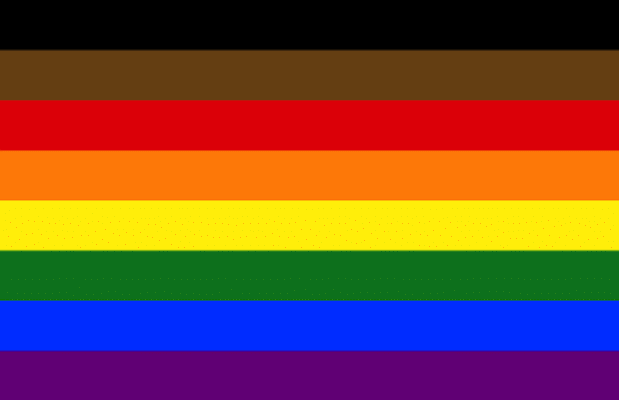
In 2017, a new version of the Pride flag was released with black and brown stripes to represent LGBTI people of color. Still, not everyone in the community is on board with that change
Last year, Philadelphia announced its decision to add black and brown stripes to the Pride flag in support of LGBTI people of color. Soon, a Pride center in Australia followed suit. Now, research conducted by Buzzfeed News and Whitman Insight Strategies shows who is most opposed to this change.
The survey
The poll surveyed 880 LGBTI adult Americans. It was part of a larger body of research about life, politics, and identity among LGBTI individuals.
Of the 880 surveyed, 58% oppose the addition of black and brown stripes on the Pride flag. 42% support the change. The most opposition came from gay men and those over 50, with both groups opposing the new stripes 70% to 30%.
Additionally, white people opposed the change 62% to 38%.
Meanwhile, the same survey found that LGBTI people of color narrowly support the change in the flag, 52% to 48%. Queer and trans people support the change 64% and 69%, respectively.
Lesbians and bisexuals were more supportive of the new flag than gay men, with 41% of lesbians and 47% of bisexuals in favor of the new stripes.
However, the biggest divide came generationally. LGBTI people between the ages of 18 and 29 were more supportive of the inclusive flag, 52% to 48%. Yet, less than a fifth of Baby Boomers agree with it.
The survey’s margin of error overall is plus or minus 3.3%.
Racism is still a huge problem, even in the LGBTI community
‘People of color have been at the vanguard of LGBT political advocacy and culture for decades, and yet, they have long been denied full recognition — and representation — for their contributions,’ writes Dominic Holden for Buzzfeed News.
‘The 2015 movie Stonewall, for example, portrayed a white man at the genesis of the modern LGBT movement while downplaying people of color and transgender women. LGBT bars have also been accused of racial discrimination.’
Another recent poll by UK charity Stonewall found that two-thirds of black people who identify as LGBTI face racism from within the community.
‘This research gives a worrying insight into just how serious a problem prejudice is within our community, and we need to talk about it,’ Ruth Hunt, Chief Executive of Stonewall UK, said.
‘Users of dating apps will be familiar with phrases like “No blacks, no Asians” and “No chocolate, no curry, no rice, no spice,”’ Hunt added. ‘This is unacceptable and it causes damage and mistrust.’







